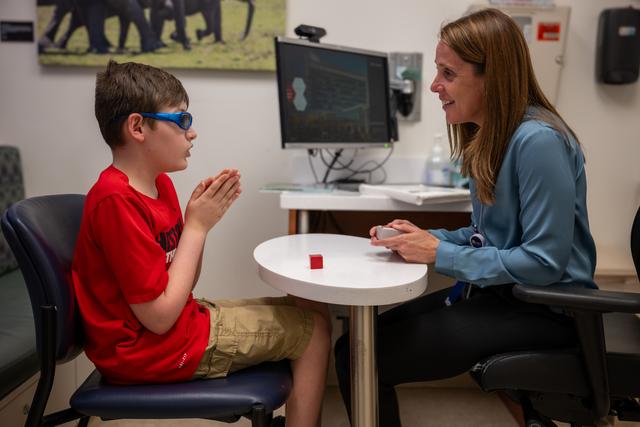
For families with a child who has autism and epilepsy, meeting their medical needs can be complex. Managing multiple doctors’ appointments, travel, and balancing recommendations is just the start. What should they do when their neurologist and developmental pediatrician have different treatment plans and they conflict?
At UVA Health Children’s, a team of providers envisioned better for these families: A single appointment where families could collaborate in real-time with a neurologist, developmental pediatrician, and neuropsychologist. The Clinic for Autistic Pediatric Epilepsy (CAPE) is a unique program that meets kids where they are.
Erika Axeen, MD, and Katheryn Frazier, MD, come from different specialties. But each was encountering individuals from this patient population. By creating a multidisciplinary clinic, they knew they’d be better able to meet their patients' needs.
The Connection Between Autism & Epilepsy
While only around 2% of children have epilepsy, that risk doubles for autistic children. For those who have both autism and an intellectual disability, the risk is significantly higher than that, with nearly 20% developing epilepsy.
Autistic people are also more likely to have epilepsy that’s resistant to standard treatment. That means it’s important to have experts who can offer specialized treatments and work with families to find the best options.
Leaders in Pediatric Epilepsy Care
As a level IV epilepsy center, UVA Health Children’s offers a wide range of treatments. Axeen elaborates, “We're a comprehensive epilepsy center, so this means we offer all the services necessary to treat children with epilepsy, whether it's a straightforward epilepsy or more complex epilepsy. So we offer access to medications, dietary therapy, devices such as a vagal nerve stimulator, or in some children, even a surgical evaluation." We offer:
- Medication
- Dietary therapy for epilepsy
- Surgery
- Epilepsy devices, like the vagal nerve stimulator
- Genetic counseling and testing
- In-patient, outpatient, and take-home EEGs
- Neuropsychological evaluation
- Neuroimaging
For families, knowing all of these options are available is important. Axeen says, “It’s really important that their child is getting everything that they need in their epilepsy care.”
Developmental Expertise
UVA Health Children’s developmental pediatric department sees many high-risk children from before they even leave the NICU. But many more children are referred as their symptoms become evident.
Frazier is a board-certified developmental pediatrician who first pursued this specialty because of her deep understanding of families whose children have developmental needs. “Really, I could understand what these families were going through, and decided this was my true home, to help them.”
Developmental pediatricians are experienced with longer appointments that focus on getting to know each child and their family. This helps them align on goals and have a deeper understanding of what’s important to them.
Comprehensive, Collaborative, & Convenient
Instead of going home with just a better understanding of their child’s seizures or development, families go home with a full treatment plan. And they don’t have to run around the hospital to get it.
Once families are comfortable in their exam room, the doctors come to them, offering multidisciplinary care in one location. And, with the support of the rest of the hospital, they can also provide support and help patients with older children prepare for the transition to adulthood.
Referring Patients for Epilepsy Evaluations
If you have autistic patients with symptoms that could be explained by epilepsy, helping them get the right treatment could improve their overall care.
In autistic patients, some epilepsy symptoms are frequently missed, like:
- Staring off
- Arms and legs jerking uncontrollably
- Stiff muscles
- Repetitive Movements
These patients are also likely to be intimidated by the idea of an EEG. But at a pediatric hospital, we can accommodate their needs while still getting the data needed to offer help.